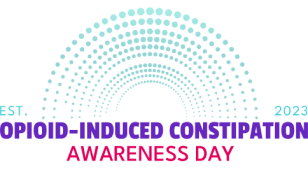~40-80% of patients taking an opioid for chronic pain may experience OIC.

Constipation is one of the most common side effects of opioid pain medication.

Could I have OIC?
Share the symptoms you are experiencing with your healthcare provider.

WHAT IS OIC?
Opioid-induced constipation is a common side effect of opioid pain medication.
OIC can last the entire time you are taking your opioid medication. It is not likely to improve over time or with a change or reduction in the opioid dosage.
Over-the-counter (OTC) laxatives are intended for treatment of occasional constipation, but are not meant for long-term use. Approximately 80% of patients taking daily oral opioid therapy and OTC laxatives reported still being constipated.
title
COULD I HAVE OIC?
SYMPTOMS OF OIC
- Reduced bowel movement frequency (eg, <3 bowel movements per week)
- Development or worsening of straining to pass bowel movements
- Sense of incomplete evacuation
- Harder stool consistency
DO THESE APPLY TO YOU?
- I take an opioid to help manage my chronic pain.
- I've experienced new or increased constipation, <3 bowel movements/week, worsening of straining to pass a bowel movement, a sense of incomplete evacuation, and harder stool consistency after starting my opioid therapy.
- I’ve taken/am currently taking OTC laxatives to help manage my symptoms.
- I'm not experiencing relief of my symptoms with the current treatment I'm taking.
TREATMENT OF OIC
There are medications available that can help manage OIC.
Although commonly used to help manage constipation, OTC laxatives (eg, Miralax®, Colace®, and Senokot®) are meant to treat occasional constipation.

Prescription medicines that target the underlying cause of OIC are available.
Peripherally acting mu-opioid receptor antagonists (PAMORAs) are approved to help manage OIC.








